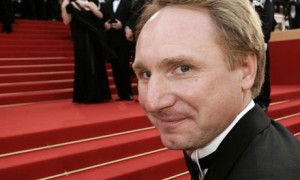While the original source of public fascination may be the celebrity’s creations, there is a tendency for public interest to fasten increasingly on the person, rather than, in the case of a writer, on his works. (163)
Normally if you were to pick up an issue of People or Vanity Fair magazine, you would find such celebrities as Kim Kardashian or Jennifer Lopez on the cover, but in an age where the author is now a celebrity you can find famed Twilight author, Stephanie Meyer, headlining TMZ (a popular celebrity gossip website), J.K Rowling on the cover of Entertainment, and Dan Brown at a red carpet event mingling with the likes of Leonardo DiCaprio, Gisele Bundchen, and Will Smith, among others.
In his article, The Writer as a Celebrity: Some aspects of American Literature as Popular Culture, John Cawelti states that “the emergence of writers for whom celebrity has become in different ways the center of their art, have made writers in general more conscious of the problem of celebrity and its potentially deleterious effect on their work.” Contrary to this statement, though I understand the conundrum of the author of either embracing the media and the idea of “celebrity” in order to reach a higher audience, or risking the possibility of having a smaller audience by remaining relatively mysterious, I believe that today’s author’s such as Dan Brown and Stephanie Meyer are more focused on being a celebrity than a writer. Although authors are not on the same the level of fame as Angelina Jolie or Brad Pitt, nevertheless, they are still celebrities who are making millions of dollars a year and making best dressed lists.
Instead of focusing on their craft and creating new works, J.K Rowling has become the face of numerous charities while Stephanie Meyer has gone on to create her own clothing line. Not to say that what they are doing is necessarily bad, but what about their craft? Since the release of the Harry Potter novels, J.K Rowling has not released any new works, and Stephanie Meyer and Dan Brown, aside from their popular novels, have only published one other work which is coincidently or not within the same realm of the novels that made them famous.
This makes me question whether these authors are relying on their franchises and the money they made from them to live, and to hold on to their celebrity status. I feel that these authors believe that they no longer have to continue writing because of the fact that they are set for life. This type of mindset, therefore, gives the author the opportunity to become more invested in the celebrity world. Cawelti warns us of this possibility by writing “the energy and emotional investment he gives to playing the role of person-performer inevitably detracts from what he can give to his proper work.” (171)
This ultimately brings me to my last question – will the “author” ever fade? As a result of the author having been “swallowed up into the myth of his celebrity, of becoming the simplified persona of his public legend” (171), this has given rise to an innumerable amount of pseudo writers. Now that greats like J.K Rowling have taken a back seat, such celebrities as Snookie, Chelsea Handler, Kendra Wilkinson, and others have emerged as writers. Because we live in a society that is consumed with the idea of knowing the past of the author and of who he or she is, we feel confident enough to know who they are through their television shows to send them right to New York Times best sellers list, but are what these “authors” creating really art?
Can we really say that Snookie, the same girl who said that she feels “like one of those pilgrims from the 1920s” while washing dishes, an author? The more that real authors are swallowed by Hollywood, more of these nonsense novels are created, therefore, over time decreasing the significance and value of the “author”, and the art of writing. Eventually less great works will be made, and the notion of the “author” will come to an end.



Jon,
Your post is thought-provoking. My instinct is to disagree with your prediction that great works will become rarer and the concept of author will end. Popular culture gives us plenty of reasons to fear the future, but I feel more hopeful when I shift my perspective toward scholarship. True, celebrity culture is expanding, but scholarly endeavors are yet alive, and perhaps slowly expanding their reach as well. When we encounter popular culture, perhaps glancing at the television, or perusing the covers at a bookstore, or even (heaven forbid) reading People magazine, we cannot avoid the over-valuation of celebrity. Fortunately, there are other perspectives, such as we encounter when reading academic journals. Cawelti defines celebrity as “popular interest in a person beyond or aside from his works or accomplishments” (163). I choose to believe that a writer’s works will be judged on their own merits, especially as celebrity fades and writings are reread and become part of the literary dialog.
Even though the Cawelti article was published 34 years ago, in 1977, it can inform us about the development of a celebrity culture around certain authors. Cawelti’s examples of celebrity authors may surprise us – I didn’t think of Dickens in that category, for example – but we can use the benefit of those 34 years to evaluate Cawelti’s argument that celebrity is usually fleeting. He mentions Norman Mailer, who was no stranger to popular culture in 1977 (or in 1980 – yikes!), but who certainly is today! As I recall, Mailer’s celebrity had begun to fade even before his death four years ago extinguished it for good. Meanwhile, how did the other authors cited by Cawelti fare? I am reading several of them (including Cooper, Hawthorne, Melville, Twain, and James) in my Development of the American Novel class this semester, so I would argue that the academic reputation of a worthy author is constantly refreshed, even as his celebrity fades. In a decade or two, we probably won’t be talking about Snooki, and her ‘books’ may be out of print, but literature classes will certainly still read the authors listed above. Which recent works do you suppose will be viewed as literature 30 years hence? Will anything on our reading list for ENGH 400 make the cut? Who do you expect to decide that? Call me an optimist, but I expect the English Department to survive and thrive.